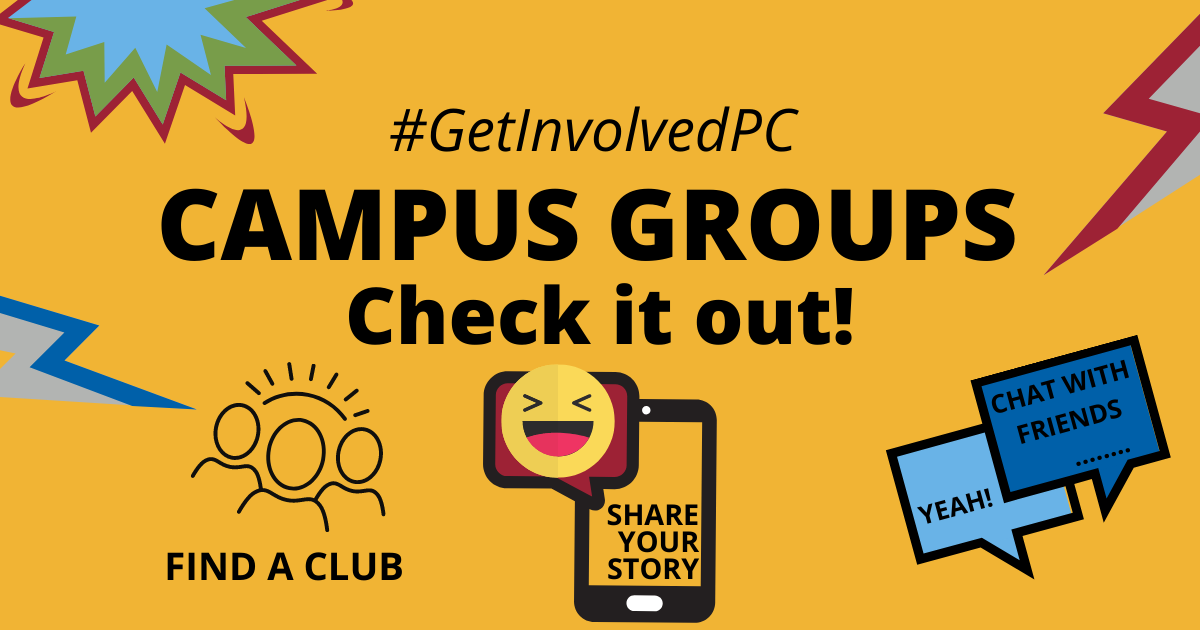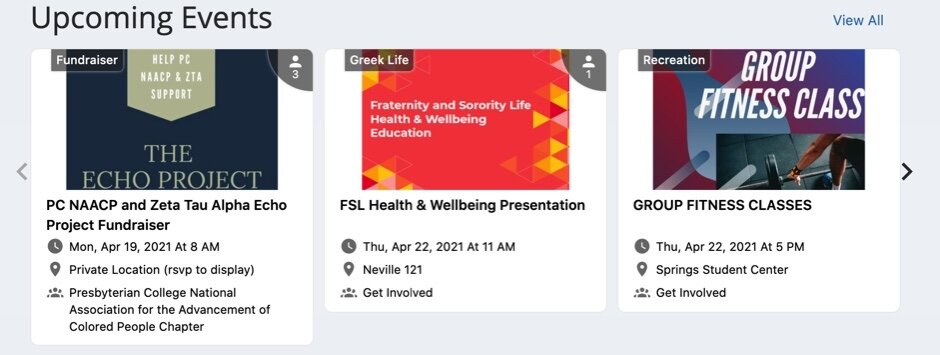5 Tips for Increasing Student Involvement: Implementation of CampusGroups Student Engagement Portal at Presbyterian College
/To increase student engagement, Presbyterian College’s Office of Student Involvement selected CampusGroups in December 2020 as the college’s dedicated technology solution. After just one month, CampusGroups launched as the college’s official student involvement platform.
Here are 5 tips for selecting and implementing a student engagement software, based on Presbyterian College’s successful roll-out!
1. A dedicated one-stop-shop solution
Presbyterian College was looking for a one-stop-shop solution to replace a patchwork of communication channels, including email, Instagram, Google forms and calendars.
According to Director for Student Involvement Daniel Adams “the key advantage of CampusGroups was that it provided a single solution to several friction points”. These included, increasing student knowledge of what is available on campus in terms of clubs and events, getting students to complete forms and connect to each other (in-person and virtually).
“Communication has been made easier by the fact that we now have a single go-to system” said Taylor Dement, Assistant Director of Student Involvement (Orientation & Events). With a broad-range of customizable features from group and event registration, to tracking and reporting—available on the mobile app and web-based portal—the CampusGroups solution is holistic.
“Both students and administrators love the breadth and flexibility of the platform, with its different communication channels. They also really appreciate that one can interact with the system based on personal preferences” Adams added.
2. Involve students in the portal selection
The Office of Student Involvement’s strategy was to involve students in the process from day one. In partnership with student government and an on-campus development committee focused on media and technology, Student Involvement started looking for a campus engagement system in the fall of 2020. CampusGroups was selected in December of 2020, with a soft launch scheduled for January 1, 2021.
According to Adams, CampusGroups was selected because it answered the question of “how to communicate to students, delivering the information they want, when they want, and how they want”. “Students especially love the fact that with the app, the system is literally in their hands, as that’s how they interact with the world” Adams added.
From an administrative perspective, the platform also brought about numerous efficiencies. The portal’s event approval form, workflows, detailed tracking and reporting features, available directly via the portal or by email, have helped streamline processes.
The system’s online communication modules, including virtual fairs and orientation, among other features such as virtual coffee chats that are currently being developed, were also a big draw. Beyond the Covid-19 Pandemic, the ability to maintain touchpoints through the system over the summer is a great way to keep the student body engaged in campus life, contributing to increased retention rates.
3. Involve students in the roll-out
The system launched in January 2021, with “a soft opening and without a big communication plan to push it” said Dement. Getting students into the system was the first big hurdle. The macro goal was to get students into the platform and have the system drive people to it organically. “We set a goal of 400 system downloads by May 2021, for an undergraduate population of under 1,000, and reached this milestone one month early”.
Events were key to getting students into the system. “The event registration and submission processes were really helpful in getting students and administrators organized and using the platform”, according to Adams. Another funnel has been that “Registered Student Organizations (RSOs), have to be registered in CampusGroups and go through the system to request and receive funds” Adams added.
The system also helped structure how events should take place and knowledge sharing, given the Covid environment. The system is now naturally driving people to it, and the goal is to get it well-oiled over the summer for orientation.
According to Dement, “the next step is to increase usership by getting users to leave old methods of communication”. “I think this will happen with time, when users understand that they can do everything within CampusGroups.
Students are already noticing that when they post photos on the student feed, they get more meaningful interactions than when they post on Instagram” he added. To further incite student participation, Presbyterian College is leveraging the system’s gamification features or online reward system and giving out virtual badges and prizes for badge earners.
Presbyterian College’s upcoming events as displayed on the CampusGroups student engagement portal.
4. Make students champions of the system
Presbyterian College’s deliberate strategy was to get students to see the benefits of the system and share their story. “Minimum market standards informed us that it’s best to find student champions to work with, allowing that to drive people into the system and elevate the process” Adams said. Student organizations jumped on board rapidly, and there are now over 50 active groups.
Some key takeaways from the data analysis and student involvement statistics in the early stages of roll-out, were that emails coming from students received more traction than those coming from staff. This helped confirm the notion that the best communication campaign would come from students themselves.
Since they had to use the system for events, the student body quickly got acquainted with CampusGroups and immediately started to see its benefits. Student groups really like the ease of using the attendance tracking feature for events. Sororities and Fraternities, which have to register attendees, have also expressed how user-friendly the workflow is. “Students really wanted everything to be available on their phones and to limit emails, which the system is built for” Adams said.
This semester, the Office of Student Involvement worked with RSOs that were early adopters of CampusGroups to share through social media what issues the system has solved for them. Student Involvement will also launch a communication campaign over the summer, to keep the student body engaged in campus life and increase retention rates. In addition, “in the fall we will have a strategy to communicate the why the what and the how of CampusGroups, led by students that have become system advocates”, said Dement.
5. Ensure key stakeholders have a good understanding of the system
One of the difficulties of having such a large and complete system is that in the beginning there is a steep learning curve. “The fact that we had a soft-launch in January and time to learn the system ahead of the new school year was really great” according to Adams.
“We also really took the time to make sure that key users had a thorough understanding of the platform, working one-on-one with student groups to develop their group page and figure out how and why they were going to use the system” he added. To this end, the Office of Student Involvement has also started talking about rolling out a “did you know” campaign to demonstrate all that the system can do.
According to Dement, “It’s a big system, which is what we loved about it, but it also takes time and guidance to know where everything is housed and best practices in using the portal.” Presbyterian College has also implemented a CampusGroups feedback form on the Homepage to get thoughts from student users and identify any pain points.
Another key to Presbyterian College’s successful roll-out was working with the CampusGroups Customer Success and Support teams throughout the implementation and early roll-out stages. “The live webinars and recordings have also been really useful in better understanding the system, as was CampusGroups’ annual user community conference RendezVous, enabling us to dialogue with and learn best practices from the CampusGroups team and peers in other universities and colleges” Dement added.
By involving students throughout each stage of the process, from technology selection to system roll-out, and platform optimization, Presbyterian College has optimized the way students engage and communicate. Congratulations to the team at Presbyterian College on the success of their implementation and roll-out!
Interested in learning more about CampusGroups? Please contact us for a demo to see how our solution can help keep your community connected and engaged!

















When you land on the website for the University of Wisconsin-Stout, you're met with a bold, single-word headline: "Ready." That word encapsulates UW-Stout's guiding mission. As Wisconsin's premier polytechnic university, UW-Stout proudly offers career-focused educational programs that give students hands-on experience for success in their chosen career fields—and, in practice, some of the most important and impactful experiences take place outside the classroom.